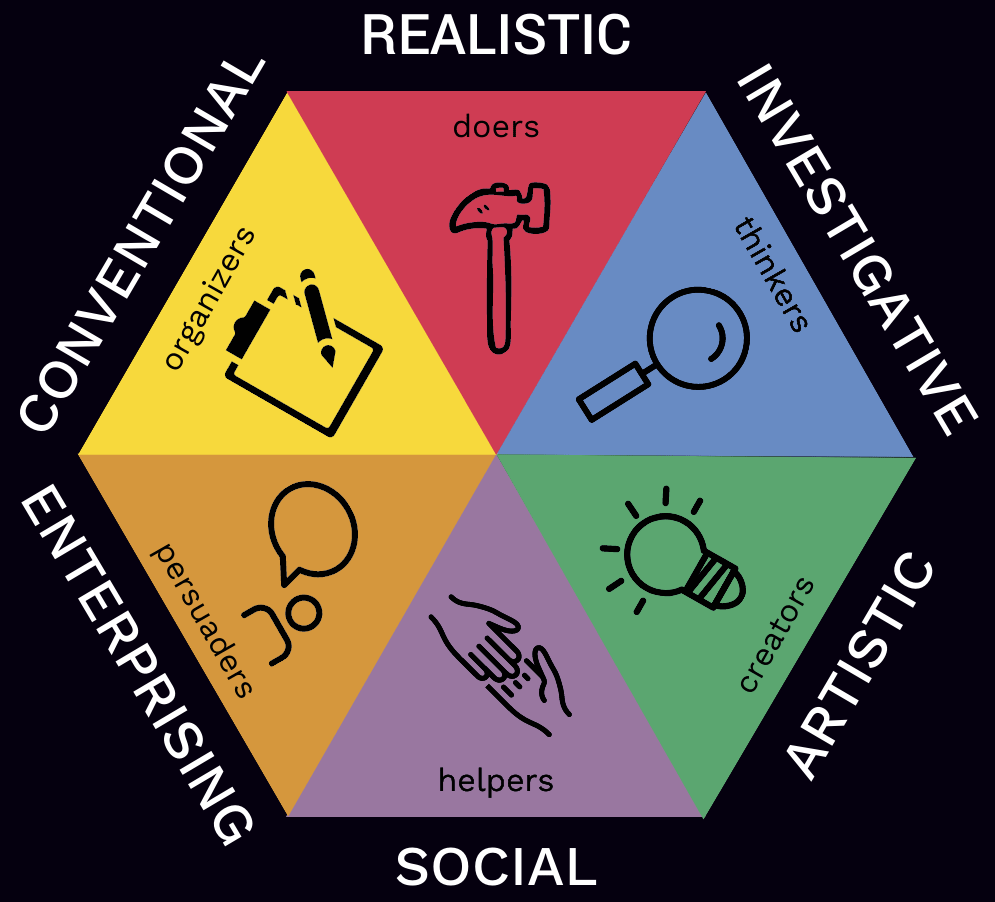INTPs are a special breed of people. With a unique worldview, brutal honesty and innate need for introspection, they behave differently in the workplace than other personality types.
If you have an INTP personality yourself, you can use this article to discover jobs that fit your mode of operating better. We’ll look what type of work, organizational structure and work relationship works well for you. As it turns out, INTPs tend to work certain types of jobs, but do these jobs actually utilize an INTP’s abilities to the fullest? Let’s find out.
What makes an INTP?
The INTP is one of the 16 personality types described by the Myers-Briggs Type Indicator (MBTI). It is someone with Introverted, Intuitive, Thinking, and Perceiving personality traits. They are sometimes referred to as The Thinker or Logician.
INTPs are creative individuals that love to question everything. They spend a lot of time in their own mind and hold themselves to strong moral values. They are inventive and often choose unconventional paths in life.
In contrast to extraverted personality types, INTPs are fine with being on the sidelines, away from the center of attention. They don’t shy away from social interactions, but these events can be exhausting, especially if it involves a lot of boring small talk. After socializing, they will prefer to take some time for themselves in order to recharge. Time alone is not boring at all, because their minds will keep them occupied for centuries.
To other people, INTPs may come off as quiet, reserved, or even shy. But on the inside, there is a lot of activity; INTP are the prime example of still waters run deep. They have a broad interest, love exploring new topics and having deep conversations, and they constantly strive for self-actualization. Additionally, they are very observant, so they are more aware then they let you know.
The INTP at work
Efficient laziness
INTPs have the reputation of being lazy. They don’t like doing repetitive tasks that take up a lot of time. Instead, they will search for the optimal method to perform a task or try to circumvent the task altogether. If they don’t like a step in the process, they will try to skip it by finding a way to hack the system. If one has to break a few rules along the way, so be it.
Laziness has a negative connotation, but in the case of INTPs it is often a strength if used well. Their search for the path of least effort leads to efficiency. They come up with inventive solutions that might improve the entire business’ efficiency, only if their superiors are open to listen to them.
But if their not-playing-by-the-book will cause repercussions, they will keep their new-found methods to themselves and not even share them with colleagues. This way they will be able to outperform their colleagues and free up more time for tasks that they actually like.
“I choose a lazy person to do a hard job. Because a lazy person will find an easy way to do it.”
~ Bill Gates
They don’t like to be told what to do, and don’t fare well in autocratic structures. Too many management layers, and you’ll spend your entire day just working on bureaucratic tasks that take away your creative freedom.
INTPs do not feel at home in power structures based on status. Instead, they like to place themselves outside the hierarchy and do not hesitate to dismiss those in power. However, it should be noted that they do not aim for revolt within the company, but they would like to have an autonomous position so that they can do their work without interference. Therefore, team managers: just let them do their thing, and they will be most productive.
If rules don’t make sense to them, they don’t follow them. They will obey the spirit to the law, but not down to the letter.
Rule: Wear a mask at all times.
Goal: Protect each other from transmittable diseases.
INTP Interpretation: Wear a mask when people are around.
Rule: Please turn off your phones during the presentation.
Goal: Give full attention to the presenter.
INTP Interpretation: Put the phone on silent.
Rule: Dogs should be on a leash at all times.
Goal: People shouldn’t feel threatened by your dog.
INTP Interpretation: My dog behaves and listens well, so unleash him!
Dislike of routines
An INTPs disregard for structure is also reflected in how they deal with routines and schedules.
As an employer, it is better to give the INTP a series of tasks to complete, rather than a set schedule. Let him go home early if he finishes before 5, and he will work overtime without a grudge if the work demands it on other days.
If the INTP in your company shows up late often, don’t put the blame on him or her. In most cases, that person is late because he feels there is little reason to be on time. Forcing an INTP to be on time by using stern language or fines will only be counterproductive. Instead, give them more responsibilities, more objectives and occasionally turn a blind eye if they are an hour late. As long as the work gets done, right?
Even though INTPs are pretty good at making a to-do list, sticking to the list is a whole different ballgame. Any plan is subject to change, as they figure stuff out along the way. This makes them good at improvising, but not at completing projects. They don’t mind leaving things half complete, because tasks of a ‘higher priority’ have occurred. Higher priority in the INTP’s opinion; not necessarily in the company’s best interest.
Relation with coworkers
An INTPs identity remains the same, regardless whether other people are present. He will not please people, he is the same person no matter what social context.
They get along with people from all levels of the organization. They are not afraid of how hanging out with a ‘lesser’ person will reflect negatively on their image. Image and ego is nothing to them.
Small talk is a waste of time and doesn’t interest us in the slightest. We don’t care about your everyday chitchat about coworkers, barbecues, shopping trips or what you ate yesterday. We often don’t know what’s going on when it comes to gossiping or social media outrage. INTPs are more intrigued in discussing the bigger questions of life; like whether dolphins use language, what would happen when aliens visit earth and what weapon of mass destruction would be the most effective.
That’s also why INTPs are not a big fan of meeting after meeting, because before you get past all the chinwags and to the topic, you have already wasted 15 to 30 minutes of precious work time.
What are the best jobs for INTPs?
One of the most helpful career interest tools is the RIASEC model. This model by John Holland distinguishes six job domains: Realistic, Investigative, Artistic, Social, Enterprising and Conventional work. Similar to the Myers-Briggs test, the RIASEC model results a multi-letter code (e.g. RIC, SIA, EA) that displays your top two or three interest domains.
Your individual RIASEC preferences are unique, but a 1998 study looked into the preferences of the ‘average’ INTP. This study found that INTPs are confident in Realistic, Investigative and Conventional jobs, and like these jobs the most. But counterintuitively, they were most likely to perform Artistic jobs.
Realistic professions (Things)
Individuals with Realistic interests enjoy hands-on work, often involving machines (e.g., repairing vehicles, tinkering with computers, operating machinery). They may take up careers in technology, construction, agriculture, and other trades. They are often kinesthetic learners with good spatial reasoning abilities. They can competently utilize schematic diagrams, as well as envision and mentally rotate 3-D objects. They’re often said to enjoy working with “things” more than people, and don’t mind getting their hands dirty.
Examples of Realistic jobs: mechanic, technician, plumber, carpenter, engineer
Investigative professions (Ideas)
Investigative types enjoy working with ideas and theories. They generally perform well on the mathematics portion of aptitude tests. Investigative work often requires the ability to focus and think deeply about something for extended periods of time.
An INTP’s analytical skills come in handy in these types of professions. In addition, he or she can make sound objective judgments, think rationally, and navigate emotional arguments and fallacies.
Examples of Investigative jobs: scholar, scientist, non-fiction writer, translator, psychologist, consultant
Conventional professions (Order)
Those with Conventional interests tend to enjoy clerical, organizational, or administrative work. They are typically organized, detail-oriented, and good with administrative tasks.
INTPs are able to put complex and efficient processes in place, but would feel trapped if they had to follow these strict rules themselves. Therefore, many INTPs will only be able to appreciate Conventional jobs when they have decision-making rights in the process.
Examples of Conventional jobs: accounting, filing, bookkeeping, secretarial work, banking, proofreading, data entry, auditing, notarizing, and payroll.
Artistic professions (Creativity)
Artistic types often excel on the verbal portion of aptitude tests and may exhibit unconventional career or lifestyle preferences. They’re at their best when honing their craft or exploring new ideas and possibilities. It’s all about expression and presenting fresh perspectives. One will encounter a relatively large number of artistic professions in advertising, the music industry, theatre, the art sector and at companies in the field of design.
I think that many INTPs are attracted by the individualistic nature of Artistic professions, and that projects are often not strictly time-bound, but rather rely on bouts of inspiration. But INTPs will have a hard time promoting themselves and building their personal brand. Their approach is often too mechanical, while the arts are also about emotions and moving people.
Examples of Artistic jobs: designer, novelist, actor, dancer, artist, chef, copywriter
What are the worst jobs for INTPs?
Social professions (People)
The aforementioned study also found that INTPs generally dislike Social jobs, which should come as no surprise. INTPs are not really people people. The Social interest theme is often associated with Extraversion and a need for Feelers.
Individuals with Social interests enjoy helping and engaging with people. They want to inform, enlighten, help, train or cure people, and usually do not enjoy working with things. Problems should be solved through discussion and mutual empathy. Many social professions can be found in government, education, health care and social services.
Examples of Social jobs: nurse, teacher, therapist, clergy, dietician, counselor, social worker
Enterprising professions (Tasks)
Individuals in Enterprising career are generally assertive, outgoing, and self-confident. Enterprising work commonly entails the promotion of products, ideas, or services, and taking on big responsibilities. It takes people with persuasive powers and people management skills.
Most businesses and marketing firms are predominated by Sensing types, as Intuitives generally find most business jobs a bit mundane, preferring careers with more room for creativity instead. INTPs don’t like to climb the corporate ladder and tend to hop jobs a lot.
Examples of Enterprising jobs: sales, marketeer, manager, coaching, trader, politician, real estate agent

INTP and Leadership
INTPs are not often found in leadership roles. They are not drawn to the status that comes with being in charge. They don’t get high on control or the thought of managing people. Being a leader seems like being more trouble than it’s worth, as they don’t like to deal with daily details or minor issues that will inevitably come.
Democratic, hands-off leadership
But when INTPs do get nominated for a position as CEO or team leader, they turn out to be very capable leaders. They like to design larger, higher strategies that focus on long-term success. Since they dislike autocratic structures and rules, they tend to be casual, hands-off leaders who set goals and tasks, but leave the details of the implementation to their subordinates. They are democratic leaders that encourage open discussion and speak with a team-oriented “we.”
With the right, self-government team members, this leadership style can get the most out of the team, because it does not impose unnecessary restrictions. However, this does not work as well for inexperienced coworkers who need more governance and guidance.
Pitfalls for INTP leaders
Compared to more outspoken leaders, INTPs lack a degree of charisma and authority. They place themselves alongside team members and sometimes may give too much room to dissenting voices, which creates the risk of being overrun by those with more extroversion.
It doesn’t help that INTPs are not always able to communicate their – usually correct – opinions. They undermine their own position by not asserting their own achievements and by having difficulty giving direct commands. They don’t give orders, but phrase their commands as suggestions. Instead of direction, they give information, so that the person can make their own decision.
Their nonverbal communication is typically also not their strong suit, with a laid-back posture and a tendency to fidget with items.
INTPs will find that they fall short when team members approach them with emotional needs. They forget to show empathy, because in their heads they immediately start to think of rational solutions. That while the person needs emotional support and to be heard at that very moment.
Therefore, it might be better to place INTPs in a secondary leadership position, for example a consultant or advisor to someone with the extraversion, charisma and tough skin that they lack. This way they can work on developing strategies, without having to bother with interpersonal relations.

Tips for landing a job as an INTP
Overstate your capabilities
During your job interview, it is okay to overstate your achievements and exaggerate a little. I know this goes against your nature, but you shouldn’t paint a realistic picture of yourself in job interviews. See it as a 30 minute commercial that only displays your best features.
INTPs have a tendency to doubt themselves midway a sentence, which opens up opportunities for the interviewer to pry for insecurities. And because you tend to downplay your own achievements and skills, this will make you come off as insecure or incapable, even when this is most certainly not the case. Here’s how your answers may be perceived by the two parties:
INTP: “I was the best troubleshooter in the department, except for when it came to the website.”
Interviewer: “So you’re not good with websites?”
INTP: “Well, actually I’m fairly good [translation: amazing] at website architecture, but my coworker was better.”
Interviewer: “Do you think you’ll be able to handle our website?”
INTP: “I can’t see any reason why not.”
[Translation: Your website appears to be so simple that a child could manage it, but I suppose you just never know. Until then, it’s best not to make presumptuous declarations that could actually turn out to be inaccurate. Anyway, I hate showing off.]
Result: Interviewer notes that INTP is weak in the area of website maintenance.
In the above example, it would be better to exclude the exception altogether. Just say that you were the best troubleshooter in the department.
Make sure that you clearly communicate the self-confidence you’re feeling, in the way you talk about yourself and your achievements. Avoid words that cast doubt, such as: fairly, decent, maybe, usually, hopefully.
Instead, speak decisively and make use of power words.
Tell emotional stories
When there are multiple applicants for the job, you must stand out. As an INTP, the biggest gains can be made in transforming rational, soulless answers into emotional, compelling stories.
Now, this is something that is difficult to achieve overnight, but you can use the following tips to spice up your stories. A simple change of word usage can impact the attention you are receiving drastically.
Before giving your answer to a job interview question, determine the emotional state that you want the interviewer to get into. Then sprinkle your story with adjectives and nouns that evoke this emotion.
If you want to evoke curiosity:
- Let me tell you a secret
- What no one tells you
- Want to hear a scoop?
- Have you heard about
- Off-the-record, …
- I have confession to make.
If you want to evoke excitement:
- You know what was funny
- Oh it was wonderful
- Surprise!
- I feel so blessed to have
- I was thrilled
Take a look at these lists to find more power words that marketers use to evoke strong emotions.
Give inaccurate, evasive answers
Don’t answer all questions directly. I know this goes against your moral principles, but a job interview is not equal-footed conversation, but more of a head-to-head challenge you need to complete in order to fight the final boss: the job.
During the job interview, they will throw some curveballs at you, just to see how you react and how you’ve dealt with adversity in the past. Answering these questions will take some preparation. Think of the question: “what are your weaknesses?”. Don’t answer this question as you would to one of your friends, with an honest and truthful list of your weaknesses. Instead, briefly mention some minor shortcoming and then spend the lion’s share of your answer talking about how you’ve overcome this shortcoming.
For example, you could mention that you get really impatient with bureaucracy. Then talk about steps you took to prevent yourself from getting lost in bureaucratic situations. Tell them how you proposed process optimizations, cut down the number of meetings that could’ve been an e-mail and how you eliminated unnecessary paperwork in your team.
7 Personality Traits of the Sigma Male
by FreshSaga
A Sigma Male is a man who chooses to live his life outside of the traditional hierarchy of society. He prefers freedom, independence and solitude over money, status and fame. He seeks adventure and knowledge, rather than material possessions. Many INTPs will recognize themselves in this description of the Sigma Male.






